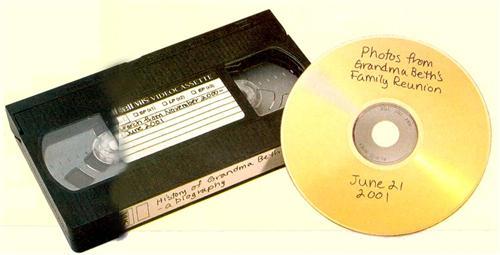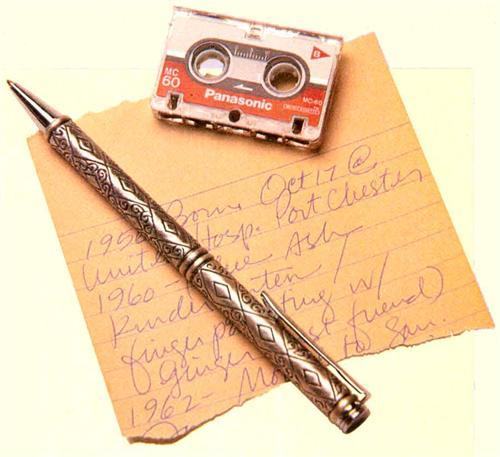Sign up for the Family Tree Newsletter Plus, you’ll receive our 10 Essential Genealogy Research Forms PDF as a special thank you!
Get Your Free Genealogy Forms
"*" indicates required fields
The idea of creating a memoir often inspires the same lament: You don’t know where to start. You’ve gotten frustrated trying to write it all down. Or you’re unsure how to compile all your memories and mementos into one neat package.
You don’t have to struggle alone — an emerging group of professionals can help you take your life story from stalled to stellar. Personal historians create a made-to-order chronicle of your life or family history. They’ll complete compilations for individuals, couples, groups or even posthumously for a favorite relative. You and your historian work together to produce whatever kind of memoir you want: book, video or multimedia presentation.
Because the field is so new, no standard qualifications are required of personal historians. Many have backgrounds in journalism or video production, and a large portion have been involved in the social services industry. Learn how to take advantage of this expertise — and finally finish your life story — with these tips on finding, choosing and working with personal historians.
Hunting for a historian
A good place to begin is the Association of Personal Historians (APH) Web site <www.personalhistorians. org>. Founded in 1994, the APH today is made up of almost 300 personal historians throughout the United States, Canada, Spain, Australia and Japan. You can use the group’s online directory <www.personalhistorians.org/members.html> to find APH members in your area. Each member’s listing gives a phone number, mailing and e-mail addresses, as well as a link to historians’ own Web sites when available.
Before you hire someone, set up a consultation (this should be free). Besides asking about format and price, you’ll want to be clear on the particulars. Ask questions such as:
• Will a written memoir be bound in a hard-or soft-cover book?
• How many copies of the book or video are included in the price?
• How long will the process take from start to finish?
• Who will own the copyright to the finished product?
• How many hours of interviewing are involved?
• When can you begin? Are you back-logged?
This is also your chance to learn the historian’s personality and working style. Make sure you feel comfortable divulging your life history to that person.
Focus on format
Consider what form you want your memoir to take. Most personal historians specialize in a particular format — printed books, video or CD-ROM, DVD or a combination of media — -so you’ll want to find one who can produce the product you want. Ask your potential personal historian to see several samples of his or her work.
Because of new technology, you have a variety of options: 150-page hardcover books, two-hour running narratives on video or CD-ROMs with hyperlinks to photo archives and family documents, such as marriage licenses and newspaper clippings. A new option is a DVD memoir, which can include video as well as text and images.
Deciding between these formats is often a matter of preference, price and time.
Preference: Think about what you want to emphasize. If it’s the words or written stories you want preserved, a book may be the way to go. Videos, on the other hand, capture a scene: “You can see gestures, facial expressions, and you get a sense of a person’s environment. It’s show more than tell,” says Audrey Galex, co-owner of Roots & Wings Life Stories <www.rootswings.com>, an Atlanta company specializing in video memoirs. CD-ROM, which allows for video and photos to be archived and accessed at random, is a good choice if you prefer a memoir focused more on images than words, says Richard Rosing, founder of Telestory <www.telestory.com>, a Nashville company that makes multimedia memoirs.
If you can’t decide on just one storage format, consider a combination project. This could include a short video to go along with a book, a written transcript of a video or a CD-ROM that includes video and text. And videos can eventually be transferred onto DVD.
Price: Video is the cheapest format, with prices starting at $1,000. CD-ROMs begin at about $5,000. Creating a manuscript ranges roughly between $3,000 and $7,000; hardcover books of the completed manuscript would then run about $50 to $60 each. DVDs are the costliest option because of their higher production price, says Rosing.
If you’ve already penned your family history (on a computer) but just need someone to “clean it up” and transform your writings from a disk to a book, the price can be as low as $400, says Bob Joyce, APH president and owner of Hawthorne House, a Santa Ana, Calif., print-memoir business <www.bookzone.com/hawthorne/>.
You’ll also want to ask a personal historian about the cost for additional recordings or books. Some offer package deals for an order of 10 to 25 copies of a video or book.
Time: Again, video is the easiest — a video without extensive effects can be completed in about a month. Depending on the amount of work involved, a book can take up to nine months to complete and a CD-ROM can take a year.
Prior to sealing the deal, ask for a contract or letter of agreement that outlines the specific service and cost and describes the final product. Read it carefully, questioning anything you don’t understand.
Getting to work
After you commission your project, you and your personal historian will set up interview sessions. Expect to be tape-recorded or videotaped for several hours, possibly on different days. Your personal historian will ask a series of questions meant to jog your memory about your life.
A good personal historian will be sensitive to recollections of difficult times, will guide you through the process and point out any inconsistencies in your tale. “In addition to simply writing your story, we can help you include things that should be in there that you didn’t think about, or advise you to take things out that could be inflammatory,” says Joyce.
Once the interviewing process is complete, your historian may have follow-up questions, especially if he or she finds inconsistencies in the story told. For written memoirs, some historians will ask if they can “ghost write” a page if the person has a difficult time telling the story in a coherent manner. Personal historians may also contact you to verify dates and places, as well as spellings of names in the text or for photograph captions, before you receive the final product.
With a book, make sure you have the option of “proofing” the manuscript before it’s published. You can preview a video or CD-ROM at any stage.
The finished product
When complete, a written memoir should be in the exact words of the person or people who were interviewed. A video must be properly edited, but whole segments shouldn’t be eliminated unless requested. And a CD-ROM or DVD should have the proper links to archives and other segments of the project. As Joyce explains, “You want a professional finished product that you and your family will be proud of for generations to come.”
From the June 2001 issue of Family Tree Magazine
ADVERTISEMENT



